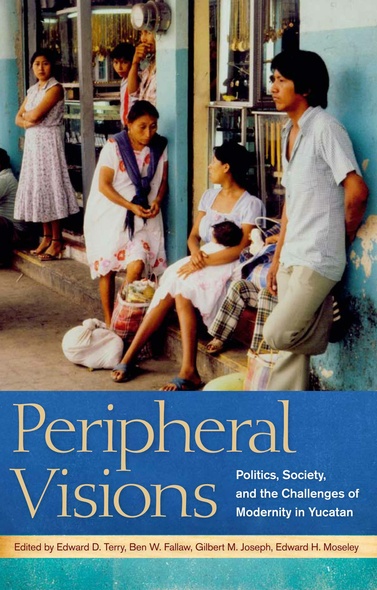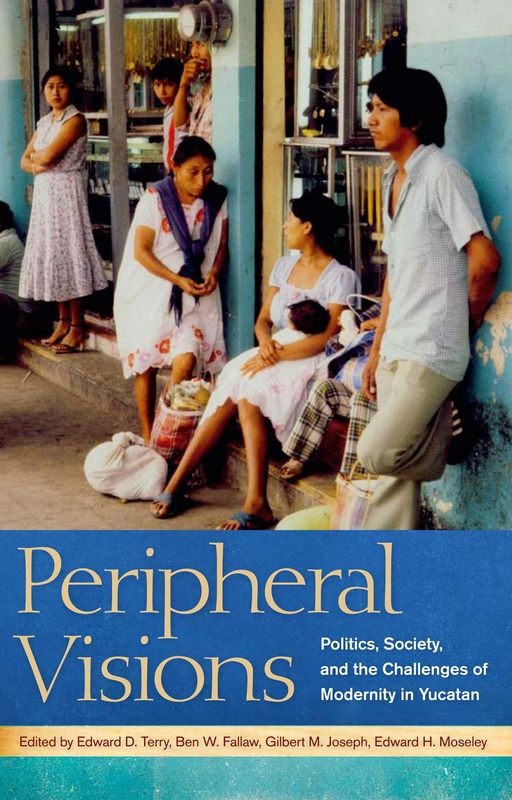Peripheral Visions
Politics, Society, and the Challenges of Modernity in Yucatan
The essays in this collection illuminate both the processes of change and the negative reactions that they frequently elicited
Yucatan has been called “a world apart”—cut off from the rest of Mexico by geography and culture. Yet, despite its peripheral location, the region experienced substantial change in the decades after independence. As elsewhere in Mexico, apostles of modernization introduced policies intended to remold Yucatan in the image of the advanced nations of the day. Indeed, modernizing change began in the late colonial era and continued throughout the 19th century as traditional patterns of land tenure were altered and efforts were made to divest the Catholic Church of its wealth and political and intellectual influence. Some changes, however, produced fierce resistance from both elites and humbler Yucatecans and modernizers were frequently forced to retreat or at least reach accommodation with their foes.
Covering topics from the early 19th century to the late 20th century, the essays in this collection illuminate both the processes of change and the negative reactions that they frequently elicited. The diversity of disciplines covered by this volume—history, anthropology, sociology, economics—illuminates at least three overriding challenges for study of the peninsula today. One is politics after the decline of the Institutional Revolutionary Party: What are the important institutions, practices, and discourses of politics in a post-postrevolutionary era? A second trend is the scholarly demystification of the Maya: Anthropologists have shown the difficulties of applying monolithic terms like Maya in a society where ethnic relations are often situational and ethnic boundaries are fluid. And a third consideration: researchers are only now beginning to grapple with the region’s transition to a post-henequen economy based on tourism, migration, and the assembly plants known as maquiladoras. Challenges from agribusiness and industry will no doubt continue to affect the peninsula’s fragile Karst topography and unique environments.
Contributors: Eric N. Baklanoff, Helen Delpar, Paul K. Eiss, Ben W. Fallaw, Gilbert M. Joseph, Marie Lapointe, Othón Baños Ramírez, Hernán Menéndez Rodríguez, Lynda S. Morrison, Terry Rugeley, Stephanie J. Smith
Ben W. Fallaw is an associate professor of Latin American studies and history at Colby College in Waterville, Maine. His first book, Cárdenas Compromised: The Failure of Reform in Yucatan, came out in 2001 (Duke University Press). In 2005 he coedited a special edition of the Journal of Latin American Anthropology on Maya identity. Dr. Fallaw is also coeditor of Heroes and Hero Cults in Latin America (University of Texas Press, 2006). Currently he is completing a study of political relations between Catholics and the revolutionary state in Mexico from the end of the Cristero War to 1940.
Gilbert M. Joseph is the Farnam Professor of History and International Studies and the recent director of Latin American and Iberian Studies at Yale University. He has published several books on Yucatan and Latin America. His most recent books are In from the Cold: Latin America’s New Encounter with the Cold War, coedited with Daniela Spenser (2008), and A Century of Revolution: Insurgent and Counterinsurgent Violence during Latin America’s Long Cold War, coedited with Greg Grandin (2009), both published by Duke University Press. He is currently working on a book that examines transnational lives and cultural encounters in the American century.
The late Edward H. Moseley was director of international programs and professor emeritus of Latin American history at The University of Alabama. He was coeditor (with Edward D. Terry) of the collection of essays Yucatan: A World Apart (University of Alabama Press, 1980) and coauthor (with Paul C. Clark) of Historical Dictionary of the United States–Mexican War (Scarecrow Press, 1997). He later coedited (with Eric N. Baklanoff) Yucatán in an Era of Globalization (University of Alabama Press, 2008), to which he contributed the essay “From Tallapoosa to Tixkokob: Two Communities Share Globalization.” A past president of the Southeastern Council of Latin American Studies, he was also executive director of the Alabama-Guatemala Partners of the Americas.
Helen Delpar was a professor of history at The University of Alabama until her retirement in June 2006. Her publications include Looking South: The Evolution of Latin Americanist Scholarship in the United States, 1850–1975 (University of Alabama Press, 2008), “The Enormous Vogue of Things Mexican”: Cultural Relations between the United States and Mexico, 1920–1935 (University of Alabama Press, 1992), which won the A. B. Thomas Award of the Southeastern Council of Latin American Studies (SECOLAS), and Red against Blue: The Liberal Party in Colombian Politics, 1863–1899 (University of Alabama Press, 1981). Dr. Delpar served as secretary-treasurer of SECOLAS and editor of the Southeastern Latin Americanist (SELA) on two occasions (1979–1982, 1988–1992) and as president of SECOLAS in 1984–1985.






